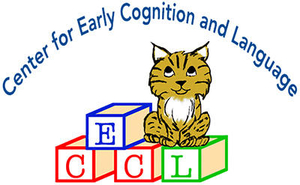False-belief understanding in infants and toddlers
Adults routinely interpret the behavior of other individuals in terms of their underlying mental states (e.g., goals, preferences, beliefs). Much of the research on the development of this psychological reasoning ability has focused on when children understand that others can be mistaken, or hold false beliefs, about the world. This question was traditionally studied using tasks in which children had to answer direct questions about the likely behavior of a mistaken individual. Children typically fail such tasks until at least age four. However, more recent research (some of which has been conducted in our laboratory) suggests that when tested with alternative tasks that do not involve such questions, children demonstrate false-belief understanding at much younger ages – in some cases as early as 6 months of age. Our ongoing research builds on these recent findings by exploring two questions. First, what is the extent of infants’ and toddlers’ early false-belief understanding? Second, what explains the discrepancy between children’s performance on traditional false-belief tasks and alternative tasks?
The role of social factors in false-belief understanding
In addition to exploring when children understand false beliefs, we are also interested in the social factors that influence the development of this ability in early childhood. In particular, we are interested in the influence of two factors: the mental-state language used in parent-child interactions and children's socioeconomic background. Children’s exposure to and use of mental-state language—terms that refer to psychological states such as think and know—is related to their false-belief understanding during the preschool years. However, little research has investigated whether similar factors might contribute to the development of this ability at younger ages. In ongoing work, we are examining the relationship between mental-state language and false-belief understanding the first years of life.
Prior research also suggests that children's performance on traditional false-belief tasks is related to their socioeconomic status (SES): children from lower SES backgrounds pass such tasks much later than higher SES children. However, the nature of this socioeconomic disparity is unclear because prior studies have relied on a single type of false-belief task that children could fail for many reasons. Moreover, few studies have examined the mechanism by which SES affects false-belief understanding, and thus little is known about the cause of this disparity. In an ongoing project funded by the National Science Foundation, we are working to clarify the impact of SES on children's early false-belief understanding.
The origins of social-group based inferences
Categorization is a vital process in human cognition. Categories not only allow us to organize our knowledge about the world efficiently, but they also guide our expectations when we encounter new information. We tend to assume that categories capture fundamental, inherent similarities amongst entities and thus use prior knowledge about a category to make inferences about the likely properties of new category members. However, applying this type of reasoning to categories of people (e.g., women) can have a pernicious effect, giving rise to stereotypes and prejudice. By the preschool years, children are attentive to social groups in their environments and use social groups to make inductive inferences about group members. Our research investigates the origins of stereotypes by examining when and how infants begin to make social-group based inferences about the characteristics and behaviors of people.
The development of trust
Trust is essential for everyday social interactions and relationships. Trust is also important to many aspects of child development because children need to decide who they can trust to teach them new information (i.e. epistemic trust) and who they can trust for social support and to keep their promises (i.e. social trust). In an ongoing project funded by the National Science Foundation, we are investigating how epistemic and social trust develops in early childhood, and whether children consider different factors when making these two types of trust judgments. We are also investigating whether children's decisions of who to trust are influenced by social categories (e.g., race) or children's socioeconomic environments.

